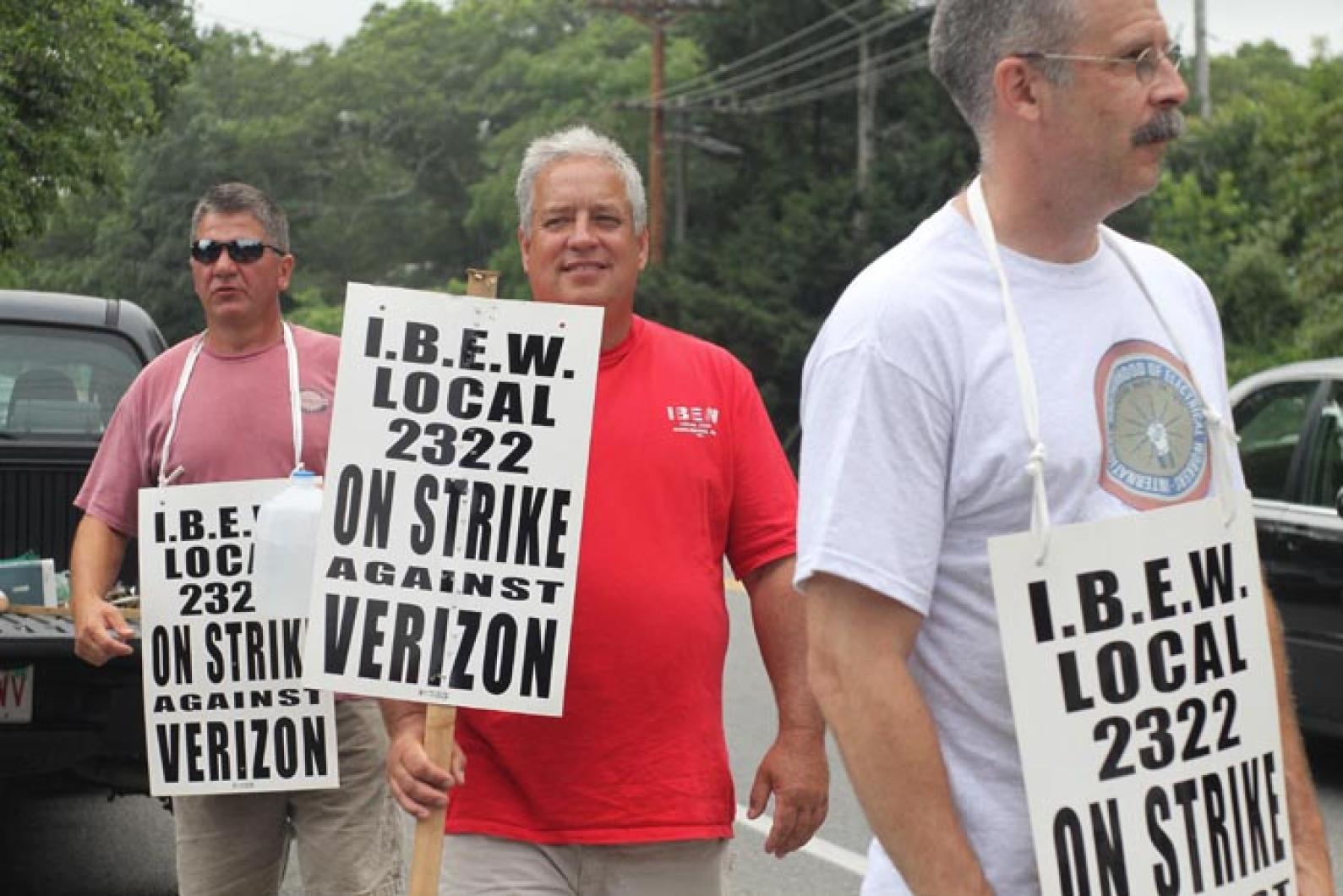In concert with their colleagues on the mainland, six striking Verizon wireline workers picketed yesterday outside the telephone company office on the Edgartown-Vineyard Haven Road in Vineyard Haven.
The strike affects the northeast region from Massachusetts to Virginia. The northeastern locals of the International Brotherhood of Electrical Workers (IBEW) and the Communication Workers of America (CWA) went on strike after their contract with Verizon, covering 45,000 union workers, expired at 12 a.m. Sunday. The dispute does not affect Verizon’s wireless division.
Both sides were at the bargaining table, but talks fell apart as the deadline loomed.
Sticking points in negotiations include proposed changes in sick days, health care and pension plans for workers. Verizon management wants to limit sick days, which were unlimited under the old contract, to 10 according to Phil Santoro, manager for media relations for the northeast region. Pension plans would be frozen at present levels for current workers and eliminated for new workers. Employees who previously received free health care under their old contract would have to pay into a health care plan. According to Mr. Santoro, one plan asks for contributions of $100 a month, but picketers said the number is far higher than that.
“We’re picketing to keep our jobs,” said Tony Novicki, the picket captain, as passing cars honked their support for the striking Islanders wearing placards. “Verizon is a company that makes a profit and they’re asking the union to make huge concessions to lower costs,” he added.
“We’re not asking for anything. We’re not asking for pay raises. [We] just want to keep the status quo,” said Mark Smith, who was picketing alongside Mr. Novicki.
Verizon’s profitability — the business made a $6.9 billion profit this year — and compensation for top executives are other pressure points in the union talks. Over the past four years, the company’s top five executives have received a total of $258 million including stock options, according to a recent story in The New York Times, a fact confirmed by Mr. Santoro.
“These folks have very good jobs with very good benefits and it’s our intention to negotiate a contract that will continue to offer these employees very good jobs and very good benefits,” he said in a telephone conversation with the Gazette. “The executives are paid for their performance,” Mr. Santoro continued. “Pay for performance, we think, is an important attribute for all employees.”
The wireline division of Verizon’s business is heavily unionized, unlike the wireless side, and faces competition from nonunionized competitors. “What we’re trying to do here is create a business model that makes sense for the business that you’re in,” Mr. Santoro said. “When you’re not doing well and that business is shrinking, you’ve got to make accommodation for that.” He continued: “The contracts that they had were written for a different time. They were written when the landline business was doing better than it is now. In 2000 we had 63 million landlines in Massachusetts; today we have 23 million. That’s a dramatic decrease . . . The business is no longer a monopoly. We don’t have all the customers anymore. It’s a dwindling part of our business.”
Eric Hetrick, the business manager for IBEW Local 2322, which covers Brockton to Provincetown and includes the two Islands, disagreed with the characterization.
“It’s kind of half truths from the company,” he said. “I certainly wouldn’t say that the landline side of our business is skyrocketing, but at the same time FiOS, which is the company’s biggest investment, is really taking off. Their overall landline profits are up over the first quarter and up over last year.” He said customers who switch from a landline to a FiOS package, which includes phone, Internet and television, are considered a landline loss. “It’s fuzzy math to say the least,” Mr. Hetrick said.
And while Verizon sees the new contract proposals as a way to cut costs on a diminishing aspect of its business, the picketers said they see it as an attack on the middle class. “We’ll be out here until they get serious,” Mr. Novicki said. “It’s a big company and they’ve turned to greed,” he continued.
Mr. Smith agreed. “If Verizon was in the same situation as the automakers where they were struggling, then I could see us making concessions,” he said. “But when they’re just fattening up their own pockets?”
He conceded the decline in the land-line side of the business. “When I first started here on the Island 23 years ago, we had about 25 people. Now we’re down to six,” Mr. Smith said.
The six current Island employees were joined on the picket line by two retired workers, Debbie Lister, a former splice and service technician who worked for Verizon for 32 years, and Denise Smith, an outside plant technician who worked for the company for 24 years before retiring. “I’ve been through the long ones,” Ms. Smith said, recalling previous strikes.
“Even in this day and age the unions still do a good thing,” Ms. Lister said.
As for any service interruption, Mr. Santoro said Verizon has trained managers and called up its retirees to perform service work during the strike.
He said only isolated disruptions had occurred in Massachusetts.







Comments
Comment policy »